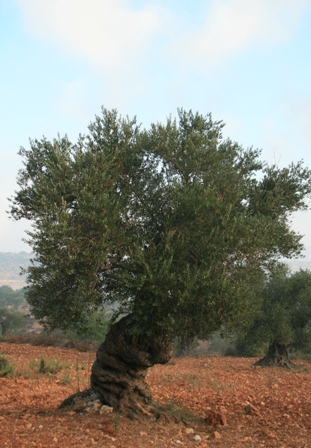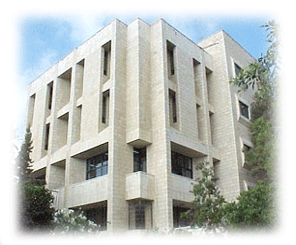Welcome to e-turathuna
|
Know your Palestinian Heritage
|
Turathuna Center
The Olive Tree


|
|
In Palestine, the olive tree is prized for its
historical presence, its beauty, its symbolic
significance, and most importantly for its
economic importance.
Olive trees are a major commercial crop for
Palestine, and many families depend on these
trees for
their livelihood. |
|

Olive Harvest |
During the second half of October until the end of
November, the
annual
olive
harvest season occurs, one of the most important harvest
seasons for the livelihood of Palestinian peasants.
Traditionally in Palestine, harvesting the olive trees
was a joyous time. All the family members leave school
and work and take to the hills and valleys where their
olive trees are abundant, and work in olive-picking
from dawn till dusk, day after day. Children, parents,
and grandparents, each have a role to play. Relatives
and friends offer a helping hand. Schools and
universities take a long weekend holiday towards the end
of the month of October
to help in picking olives.
The younger ones climb the tree to pick the olives and
throw them on the large mat placed beneath the tree. |
|

Picking
Olives 1936 |
Some trees have been producing
olives from the times of Jesus, Omar Ben Al-Khatab, Salah Eddin, and
Napoleon
Bonaparte. These ancient olive groves have provided livelihoods
for generations. There are approximately 12 million
olive trees in Palestine. The
olive
tree is often called "the Blessed Tree" (el
shajarah el mubarakah) and Fellahin sometimes swear by
it,
saying:
"By the life of the Tree of Light" (wihyat
shajarat
el nur). In Palestine it is still common to light
churches and shrines with olive oil and not any other
kind
of oil,
even with the invention of electricity and use of
electric bulbs. Babies, too,
are rubbed with oil and salt to make them strong. Old
people often begin the day by drinking a small cupful of
olive oil because of its healthy attribute of giving
strength and energy. |

An Old Olive Tree |
|

Oil Lanterns at
the Nativity Church |
There are stories and proverbs alluding to the high
value of oil, whether used raw or cooked. "A man had two
wives, one the beloved and
the other,
the hated one. Therefore the beloved one and her child
were fed with
“semneh”
(clarified butter) and the hated one and her child had
oil to eat. The children were of the same age and the
mothers perceived that when they
quarreled,
the
one who took olive oil was stronger. So the beloved wife went to a wise man and
asked 'why is it that my child who has good food is not
the stronger?' He replied, 'Semneh
for beauty, but oil for strength' (El semneh
lil zen, w el zeit lil 'asab), and his saying is
repeated as a proverb to this day.’
Another similar
saying
is, "Eat oil and
knock down
the wall" ( Kol
il zeit
wintah
il heit), i.e., you will be as strong as a goat which butts its
head against the wall. |
|
Many products are
extracted from the olive tree: among them are olives,
olive oil, olive wood, and olive-based soap.
|

A Bethlehem artist carving Olive wood |
|

Nablus Soap |
|
|
The olive tree has great importance for
Palestinian culture and identity. The olive
tree also symbolizes steadfastness because it
weathers all kinds of climate. The olive tree is
known around the world for its symbolism of
peace and tranquility. The expression "to hold
out an olive branch" means to seek harmony and
peace. |
|
|
Sources: |
|
|
- From Cedar to Hyssop: a
study in the folklore of plants in Palestine, by
Grace M. Crowfoot, The Sheldon Press, 1932 |
|
|
- Uprooting Olive Trees in
Palestine, by Atyaf Alwazir, 2002 |
|
|
- Bethlehem 2000, by Mitri
Raheb, Palmyra, 1998 |
|
|
-
This week in Palestine Issue No. 90, October
2005: "The Palestinian Olive Oil Industry", by
Basem Khoury |
|
|
- The Glory of Bethlehem, by
Bargil Pixner, The Jerusalem Publishing House,
1981 |
|
|
- Jerusalem through my
Father's Eyes, by Kevork Kahvedjian, Elia Photo
Service, 1998 |
|
|
- Palestine the Holy Land,
PECDAR, 1999 |
|
| |
|
|








